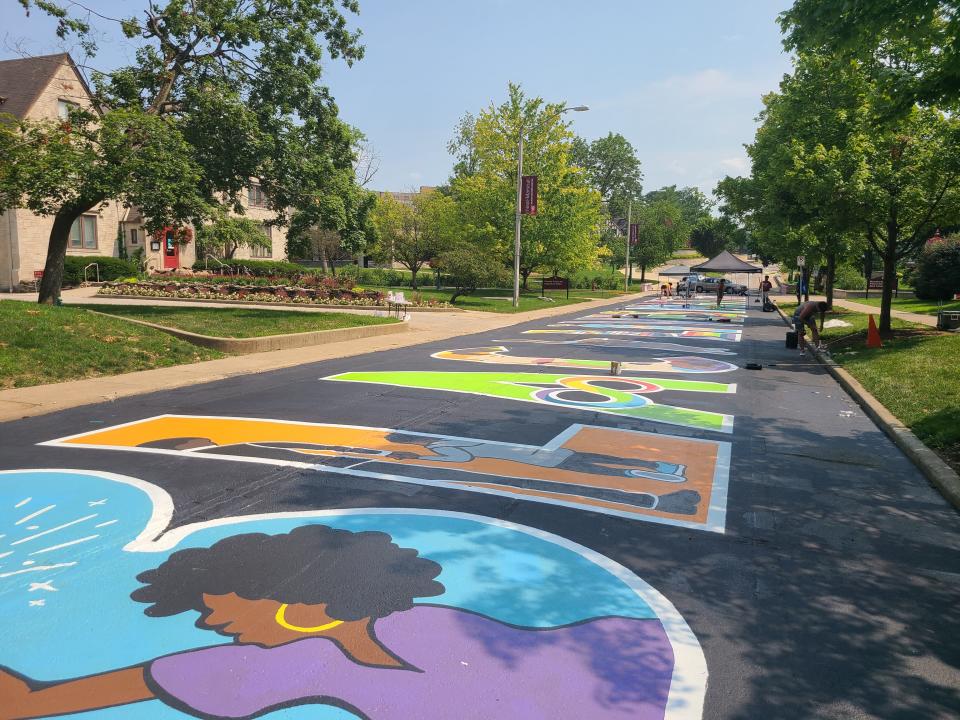Federal judge says city may have shown bias in 'All Lives Matter' street mural case
- Oops!Something went wrong.Please try again later.
Can city officials stop someone from asking to paint a mural on a public street if they don't like the message?
The answer is no, and the U.S. Constitution is the reason, according to a recent federal court ruling in a Bloomington case filed in February.
The case questioned why a city attorney discouraged an organization from seeking approval to paint an "All Lives Matter" mural on Kirkwood Avenue.
The request came after city officials supported and permitted three "Black Lives Matter" murals painted on city streets over the previous two years.
Turning Point USA member and Indiana University student Kyle Reynolds wanted to paint a mural of similar size and scope as a Black Lives Matter mural on Eagleson Avenue near the IU campus.
Previous coverage of mural:IU student sues Bloomington over 'All Lives Matter' mural rejection, alleges discrimination
The group filed a lawsuit against the city claiming discrimination, and it landed in federal court.
Last week, a judge granted an injunction against the city, saying if the case did proceed, the plaintiffs might well be able to prove city officials engaged in what is called "viewpoint bias."
"While it is, of course, true that the government need not permit all forms of speech on property that it owns and controls, and that the government can place varying kinds and levels of regulation on speech and expressive activity depending on the type of forum at issue, including in some cases by imposing content-based restrictions," the judge wrote, "it is axiomatic that, once the government creates a forum for private speech on its property, regardless of the type of forum it has created, it cannot discriminate based on viewpoint."

She cited a ruling from earlier this year in another Bloomington-based case, Dye v. City of Bloomington, rooted in the relevance of the political beliefs of a city farmers' market vendor.
"Viewpoint discrimination is an 'egregious form of content discrimination' and governments may not regulate speech when 'the specific motivating ideology or the opinion or perspective of the speaker is the rationale for the restriction,'" the judge wrote, quoting from the Sarah Dye and Schooner Creek Farm case.
Now named Eagleson:IU students create Black Lives Matter mural on Jordan Avenue
As a result of the Nov. 18 decision in the mural matter, city of Bloomington officials must, within 45 days, disseminate and make widely known "the procedural steps whereby private individuals and groups can seek approval for an encroachment on the City of Bloomington's rights-of-way for the purpose of displaying public art."
In other words, the city cannot deny anyone the opportunity to present their plan for a street mural, or other public art project. They don't have to approve it, but individuals and groups cannot be denied the chance to present a proposal.
The judge also ruled the city is prohibited from denying access to or delaying the application process for the All Lives Matter mural, which would need approval from the city.
At issue in the lawsuit was whether city officials showed viewpoint bias and violated the First Amendment rights of Reynolds and IU's chapter of Turning Point USA, an organization that seeks to "identify, educate, train, and organize students to promote principles of freedom, free markets and limited government."
Elm Street:City parks board approves two Black Lives Matter street murals
Reynolds reported that an attorney in the city legal department told him Bloomington wasn't considering adding any more street-painting projects and doesn't "take recommendations for art in its right-of-way from individuals."
But that's not the case.
"Given the apparent inaccuracy of this reason for the city's denial and the fact that plaintiffs' chosen message is plainly in tension with the city's publicly espoused view, we hold that plaintiffs have demonstrated at least some likelihood of success in establishing that the city's failure to permit them to submit a public art proposal in the same way other private groups have presented public art proposals for display in city rights-of-way was based on the viewpoint they sought to convey," Judge Sarah Evans Barker wrote.
In addition to the Black Lives Matter murals, the city has approved four neighborhood street mural projects since 2017, the ruling points out.
West Sixth Street:Black Lives Matter mural created in heart of city
The judge said Bloomington's Public Art Master Plan seems to embrace the expression of diverse views in public art.
"Art created for the public sphere can give form to core values of the community, such as freedom of speech and expression, alongside respect for diverse viewers and users and can reflect the history of the community," the ruling says, "including the evolution of taste, values, and formal expressions as well as challenge previously held views."
Contact H-T reporter Laura Lane at llane@heraldt.com or 812-318-5967.
This article originally appeared on The Herald-Times: Judge: Bloomington likely bias against All Lives Matter art proposal

